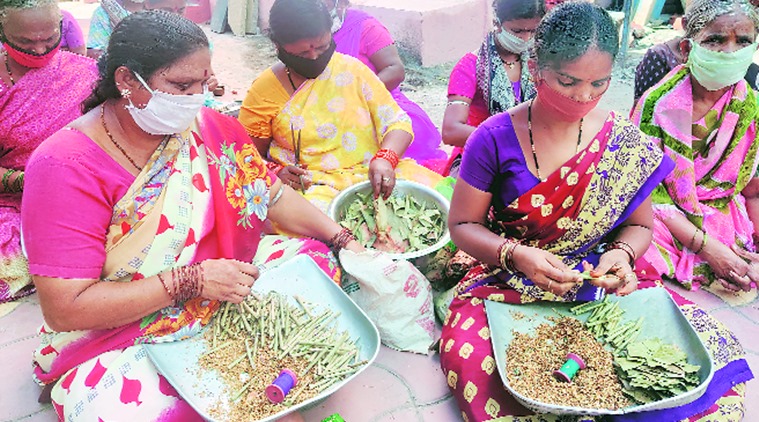
[ad_1]
 Bidi workers in Dattanagar slums sit together outside their homes to roll bidis. Photo by (Tabassum Barnagarwala)
Bidi workers in Dattanagar slums sit together outside their homes to roll bidis. Photo by (Tabassum Barnagarwala)
PEOPLE LIVING in slum settlements dominated by bidi workers are suspected to be more vulnerable to severe Covid-19 infection in Solapur city, which has a mortality rate of 7.3 per cent, among the highest in the state. The district administration is analysing if compromised lung functioning in bidi workers and locals exposed to raw tobacco could be a driving factor for higher fatality in these localities.
Solapur recorded 5,382 cases and 390 deaths until Thursday. At least 149 deaths due to the virus have occurred at Jodbhavi Peth, Vidi Gharkul, Telangipacha Peth, Muslim Pacha Peth, Neelam Nagar, and MIDC localities, all slums and semi-slums housing bidi workers. The city has over 70,000 bidi-rolling workers employed by 11 tobacco companies. The death rate due to coronavirus in the pockets where they reside ranges between nine and 12 per cent as compared to the other areas in the city where six to nine per cent fatality rate has been recorded.
“We are analysing these cases and co-morbidities [in patients]. Covid-19 deaths are caused by multiple factors including age and co-morbidity. But people living in these colonies are somehow more vulnerable,” Solapur Municipal Commissioner P Siva Sankar said.
Bidi worker Godavari Khankar (69) died two days after being hospitalised on April 19. By the time she was admitted, her oxygen saturation level was at 70 — the normal range is above 95. She had body ache and fever and later developed severe respiratory distress. Another worker, Ambubai Yallapa Gaval (56) died on May 8, 13 days after hospitalisation. She also suffered from diabetes. “When she was admitted, her chest X-ray showed haziness in the lower middle lobe of lungs. She had loose motion, a fever, and her oxygen level was at 92,” said Dr Kshama Dabir, the medical officer who audited these deaths. “No post-mortem has been done to analyse whether their lungs were already damaged because autopsy [in Covid-19 cases] has a risk of spreading the infection,” she added.
Bidi rolling involves handling of unfiltered tobacco. The tendu leaves are sun-dried, tobacco is stuffed into the centre, the leaf is rolled and tied with a thread at both ends. Bidi workers in Solapur bring the stock home from local bidi units and sit in groups of six to seven to roll the leaves in their verandahs or on the streets. Not only them but even their neighbours, who may not be directly employed by the industry, are exposed to unburnt tobacco dust. Asthma, tuberculosis and respiratory disorders are common among them.
A study in Journal of Evolution of Medical and Dental Sciences, published in July 2019, by Dr Glenn Fernandes, from Father Muller Medical College, studied 66 bidi workers in Mangalore and found 22.7 per cent had mild lung obstructive pattern. “Though people who were taken into the study were asymptomatic at present, they will have a higher risk of developing respiratory problems due to continuous tobacco exposure,” the study observed.
Dr Atish Borade, the medical officer in Solapur’s Covid Control room, said they also observe respiratory illnesses during winter in the pockets inhabited by bidi workers. “Covid-19 attacks the lungs. If lungs are compromised, the infection could be fatal,” he said. He added that even textile workers, about 42,000 in the city, are exposed to microparticles in mills affecting their respiratory system.
According to Census 2011, Solapur has a population of 9.5 lakh of which seven lakh live in slums. Slums are congested, have higher population density, and houses are located within three feet of one another making physical distancing a difficult prospect. “We also suspect people living in these settlements come late for testing, further delaying treatment,” Borade said.
In Dattanagar slums, where a big chunk of bidi workers live, a dozen women, some without masks, sit and roll tendu leaves at a chowk after bidi units reopened on July 28. “Since years we have been rolling bidis together. We can’t sit at home and do this alone. There is little space at home so we do it in verandahs,” says Dattubai Shivram (48), who has been rolling bidis since she was 12. Her husband dead, two sons jobless, the entire household depends on her meagre earnings. For every 1,000 bidis rolled she earns Rs 175.
The municipal corporation has made it mandatory for tobacco companies to measure temperature and oxygen saturation levels of each bidi worker employed under them. Those with symptoms have to be referred to the health centre, however, no check is maintained if the bidi workers referred actually visits a health centre for Covid-19 testing.
📣 The Indian Express is now on Telegram. Click here to join our channel (@indianexpress) and stay updated with the latest headlines
For all the latest India News, download Indian Express App.
© The Indian Express (P) Ltd
[ad_2]
Source link